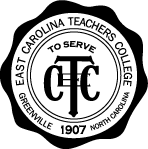
Margaret Weyher Dawson served as an ECTC trustee from 1929 until 1945, coinciding with the final years of Robert H. Wright’s (1870–1934) presidency, his sudden passing in 1934, and then the rise and fall of Dr. Leon R. Meadows (1884–1953) as second president. Mrs. Dawson was one of a succession of women appointed to the board following ratification of the 19th Amendment recognizing women’s right to vote. Mrs. Henry Groves (Elizabeth Clark) Conner (1880–1937) of Wilson was the first, but only served one year, from 1926–1927. Mrs. W. B. (Mary) Murphy (1888–1980) of Snow Hill, sister-in-law of President Wright, was the second, serving from 1927 until 1945.
In 1929, Governor O. Max Gardner (1882–1947) named three additional women to the board: Mrs. Dawson of Snow Hill and Mrs. Charles S. (Leila) Forbes (1883–1964) of Greenville were appointed to a first term, while Mrs. Murphy was reappointed. With these appointments, women came to occupy an unprecedented three of the nine seats on the board. Dawson, Forbes, and Murphy were later reappointed and served until 1945. Along the way, they were joined by Mrs. Charles M. (Ruth Moore) Johnson (1893–1972) of Raleigh, who served from 1935–1948, and Mrs. F. L. (Eula) Greathouse (1893–1970) of Rocky Mount, a trustee from 1943–1947.
This first cohort of female trustees steadfastly supported President Meadows even as his tenure in office, following a routine state audit of ECTC finances in 1942, crumbled amid scandalous revelations of financial mismanagement, misuse of student funds, and false pretense in documentation. As a result, when their terms expired in 1945, just before Meadows’ trial ended in his conviction and imprisonment, Murphy, Dawson, and Forbes were not reappointed. And, when the terms of Greathouse and Johnson expired, they were not reappointed.
Mrs. Dawson’s husband, John G. Dawson (1882–1966), a prominent attorney and successful political figure from Kinston, likely influenced her selection as an ECTC trustee. A respected political leader and graduate of UNC’s law school, Dawson served, most notably, as the State chair of the Democratic Party from 1923–1927. First elected to the General Assembly’s House of Representatives in 1919 representing Lenoir County, Dawson later served, in 1923, as speaker of the House. In 1945, the year his wife’s term expired, Dawson was appointed to the UNC board of trustees for an eight-year term.
Mrs. Dawson’s husband surely influenced her support for Meadows: along with Judge Albion Dunn of Greenville and Clay Carter of Washington, John G. Dawson served as Meadows’ defense counsel. In addition to praising Meadows’ character and long service to East Carolina, Dawson argued that Meadows’ handling of student funds was consistent with a 1924 resolution, passed by the ECTC board, allowing the president to use non-state funds in any manner he deemed fit for the good of the school.
The prosecution, noting how Meadows deposited student funds in his personal bank account and failed to credibly document his use of them, emphasized that he violated state laws and the public trust placed in him as president of the school. Disparaging the ECTC board of trustees’ earlier vote to exonerate Meadows, Solicitor D. M. Clark (1887-1948) pointedly criticized the female trustees for their blind and uninformed allegiance to Meadows, all but declaring them incompetent in his closing arguments for the prosecution. In the aftermath of Meadows’ conviction, never again would women occupy such a large percentage of the seats on East Carolina’s board of trustees.
Sources
- “Assembly Names Trustees of UNC.” News and Observer. March 15, 1945. P. 12.
- “Complaint Alleges Dawson Misappropriated Funds.” News and Observer. August 28, 1927. P. 1.
- “Dawson Outlines Record On Which His Party Stands.” News and Observer. September 17, 1926. P. 1.
- “Gov. Appoints New Trustees for E.C.T.C.” News and Observer. July 3, 1929. P. 5.
- Howland, Ralph L. “Meadows Gets 3-Year Term.” Charlotte Observer. August 25, 1945. P. 10.
- “John G. Dawson Charged With $45,000 Shortage.” News and Observer. April 1, 1938. P. 1.
- “John G. Dawson Resigns as Democratic Chairman.” News and Observer. June 25, 1927. P. 1.
- “Political Figure Dies in Kinston.” News and Observer. January 19, 1966. P. 1.
- Wilson, Leonard. “Meadows Trial Nearing a Close.” News and Observer. March 14, 1945. P. 2.
- Wilson, Leonard. “Solicitor Clark Criticizes Board: Says ECTC Trustees Didn’t Know What Was Going On, Trial Nears End.” News and Observer. March 16, 1945. P. 2.
Citation Information
Author: John A. Tucker, PhD
Date of Publication: 01/12/2023